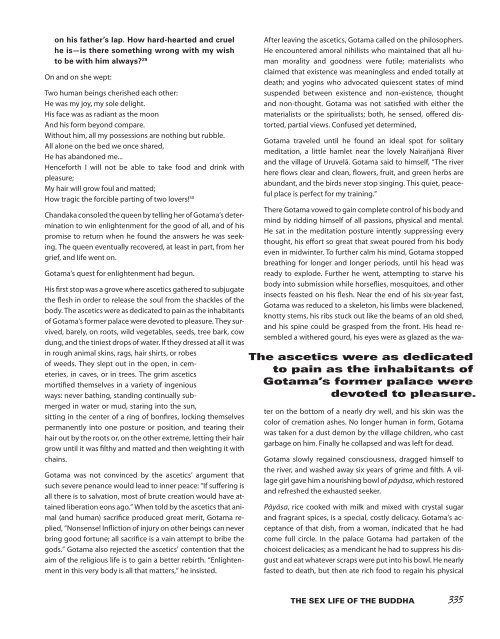You also want an ePaper? Increase the reach of your titles
YUMPU automatically turns print PDFs into web optimized ePapers that Google loves.
on his father’s lap. How hard-hearted and cruel<br />
he is—is there something wrong with my wish<br />
to be with him always? 29<br />
On and on she wept:<br />
Two human beings cherished each other:<br />
He was my joy, my sole delight.<br />
His face was as radiant as the moon<br />
And his form beyond compare.<br />
Without him, all my possessions are nothing but rubble.<br />
All alone on the bed we once shared,<br />
He has abandoned me...<br />
Henceforth I will not be able to take food and drink with<br />
pleasure;<br />
My hair will grow foul and matted;<br />
How tragic the forcible parting of two lovers! 30<br />
Chandaka consoled the queen by telling her of Gotama’s determination<br />
to win enlightenment for the good of all, and of his<br />
promise to return when he found the answers he was seeking.<br />
The queen eventually recovered, at least in part, from her<br />
grief, and life went on.<br />
Gotama’s quest for enlightenment had begun.<br />
His first stop was a grove where ascetics gathered to subjugate<br />
the flesh in order to release the soul from the shackles of the<br />
body. The ascetics were as dedicated to pain as the inhabitants<br />
of Gotama’s former palace were devoted to pleasure. They survived,<br />
barely, on roots, wild vegetables, seeds, tree bark, cow<br />
dung, and the tiniest drops of water. If they dressed at all it was<br />
in rough animal skins, rags, hair shirts, or robes<br />
of weeds. They slept out in the open, in cemeteries,<br />
in caves, or in trees. The grim ascetics<br />
mortified them selves in a variety of ingenious<br />
ways: never bathing, standing con tinually submerged<br />
in water or mud, staring into the sun,<br />
sitting in the center of a ring of bonfires, locking themselves<br />
permanently into one posture or position, and tearing their<br />
hair out by the roots or, on the other extreme, letting their hair<br />
grow until it was filthy and matted and then weighting it with<br />
chains.<br />
Gotama was not convinced by the ascetics’ argument that<br />
such severe penance would lead to inner peace: “If suffering is<br />
all there is to salvation, most of brute creation would have attained<br />
liberation eons ago.” When told by the ascetics that animal<br />
(and human) sac rifice produced great merit, Gotama replied,<br />
“Nonsense! Infliction of injury on other beings can never<br />
bring good fortune; all sacrifice is a vain attempt to bribe the<br />
gods.” Gotama also rejected the as cetics’ contention that the<br />
aim of the religious life is to gain a better rebirth. “Enlightenment<br />
in this very body is all that matters,” he insisted.<br />
After leaving the ascetics, Gotama called on the philosophers.<br />
He encountered amoral nihilists who maintained that all human<br />
moral ity and goodness were futile; materialists who<br />
claimed that exis tence was meaningless and ended totally at<br />
death; and yogins who advocated quiescent states of mind<br />
suspended between existence and non-existence, thought<br />
and non-thought. Gotama was not satisfied with either the<br />
materialists or the spiritualists; both, he sensed, offered distorted,<br />
partial views. Confused yet determined,<br />
Gotama traveled until he found an ideal spot for solitary<br />
medita tion, a little hamlet near the lovely Nairañjanā River<br />
and the village of Uruvelā. Gotama said to himself, “The river<br />
here flows clear and clean, flowers, fruit, and green herbs are<br />
abundant, and the birds never stop singing. This quiet, peaceful<br />
place is perfect for my training.”<br />
The ascetics were as dedicated<br />
to pain as the inhabitants of<br />
Gotama’s former palace were<br />
devoted to pleasure.<br />
There Gotama vowed to gain complete control of his body and<br />
mind by ridding himself of all passions, physical and mental.<br />
He sat in the meditation posture intently suppressing every<br />
thought, his effort so great that sweat poured from his body<br />
even in midwinter. To further calm his mind, Gotama stopped<br />
breathing for longer and longer periods, until his head was<br />
ready to explode. Further he went, attempting to starve his<br />
body into submission while horse flies, mosquitoes, and other<br />
insects feasted on his flesh. Near the end of his six-year fast,<br />
Gotama was reduced to a skeleton, his limbs were blackened,<br />
knotty stems, his ribs stuck out like the beams of an old shed,<br />
and his spine could be grasped from the front. His head resembled<br />
a withered gourd, his eyes were as glazed as the water<br />
on the bottom of a nearly dry well, and his skin was the<br />
color of cremation ashes. No longer human in form, Gotama<br />
was taken for a dust demon by the village children, who cast<br />
garbage on him. Finally he collapsed and was left for dead.<br />
Gotama slowly regained consciousness, dragged himself to<br />
the river, and washed away six years of grime and filth. A village<br />
girl gave him a nourishing bowl of pāyāsa, which restored<br />
and refreshed the exhausted seeker.<br />
Pāyāsa, rice cooked with milk and mixed with crystal sugar<br />
and fragrant spices, is a special, costly delicacy. Gotama’s acceptance<br />
of that dish, from a woman, indicated that he had<br />
come full circle. In the palace Gotama had partaken of the<br />
choicest delicacies; as a men dicant he had to suppress his disgust<br />
and eat whatever scraps were put into his bowl. He nearly<br />
fasted to death, but then ate rich food to regain his physical<br />
THE SEX LIFE OF THE BUDDHA 335


